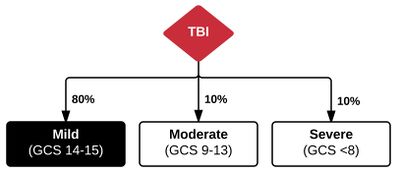Mild traumatic brain injury: Difference between revisions
Neil.m.young (talk | contribs) No edit summary |
Neil.m.young (talk | contribs) (Text replacement - "==Diagnosis==" to "==Evaluation==") |
||
| Line 9: | Line 9: | ||
***Symptoms with exertion | ***Symptoms with exertion | ||
== | ==Evaluation== | ||
*Any alteration in the mental state at the time of event or subsequent to the event | *Any alteration in the mental state at the time of event or subsequent to the event | ||
**Symptoms may be delayed by days-weeks | **Symptoms may be delayed by days-weeks | ||
| Line 22: | Line 22: | ||
{{Intracranial hemorrhage DDX}} | {{Intracranial hemorrhage DDX}} | ||
== | ==Evaluation== | ||
*Based on history and clinical evaluation | *Based on history and clinical evaluation | ||
Revision as of 22:33, 21 July 2016
Background
- Concussion (mild TBI) is defined as GCS 14-15 with assoc signs or symptoms after a blunt force or acceleration-deceleration head injury
- Types
- Simple concussion
- Gradual resolution of symptoms within 7-10d
- Complex concussion
- Persisting symptoms or cognitive impairment
- Symptoms with exertion
- Simple concussion
Evaluation
- Any alteration in the mental state at the time of event or subsequent to the event
- Symptoms may be delayed by days-weeks
- Most consistent abnormality is subtle impairments in cognitive function
- Attention, concentration, memory, processing speed, reaction time
- Physical signs/symptoms
- Behavioral changes
- Irritability, depression, anxiety, sleep disturbances, problems related to school/work
Differential Diagnosis
Intracranial Hemorrhage Types
- Intra-axial
- Hemorrhagic stroke (Spontaneous intracerebral hemorrhage)
- Traumatic intracerebral hemorrhage
- Extra-axial
- Epidural hemorrhage
- Subdural hemorrhage
- Subarachnoid hemorrhage (aneurysmal intracranial hemorrhage)
Evaluation
- Based on history and clinical evaluation
Management
- Simple
- Limitations on playing and training while symptomatic
- Follow up with primary care provider
- Complex
- Refer to sports medicine or concussion specialist
Disposition
- Upon discharge from the ER all patients with a diagnosis of concussion should receive educational materials on activities to avoid and symptoms to anticipate during recovery as those who received it have better long-term outcomesials[1]
- Recommend strict rest for 1-2 days with gradual introduction back to regular activity[2]
Prognosis
- At 3 mo after injury <30% are symptomatic
- At 1 yr after injury 15% are symptomatic



